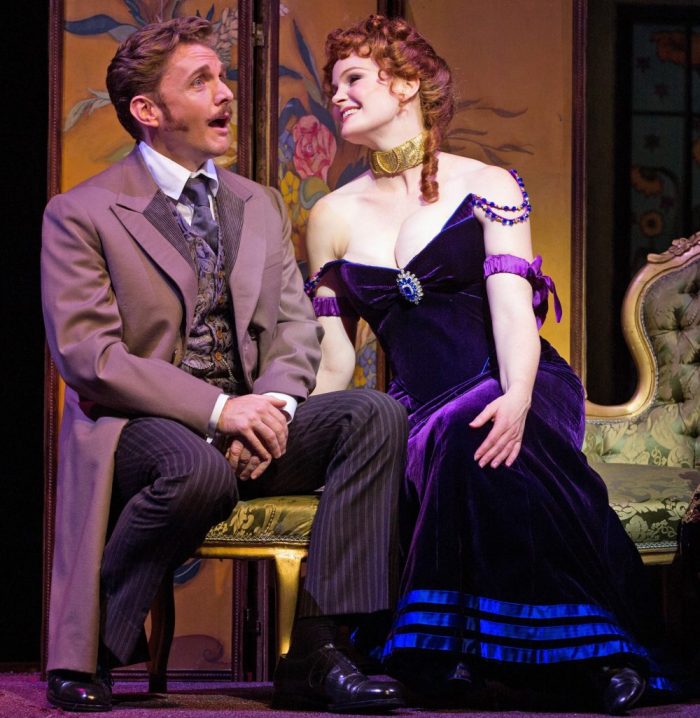
Can-Can by Cole Porter. Paper Mill Playhouse, 2014.
Do you have memories of the 1960 movie Can-Can (starring Frank Sinatra, Louis Jourdan and Shirley MacLaine)?
Wipe them from your mind. The 2014 Paper Mill revival of the stage version is a quite different experience, and is far superior. What was insipid on film is dazzling in the flesh. The script is sharper and the fine Cole Porter score is restored (the film omitted much of it). What’s more, it’s superbly sung.
Rather than a revival, this production of Can-Can is a resurrection. Can-Can was dismissed by critics in 1953 and butchered in its movie version in 1960. Now it’s back in a revision that’s spectacular, funny and tuneful.
Can-Can had only one Broadway revival in the past sixty years, in 1981 when it folded in two weeks. The revival and the film cut much of the score and replaced it with extraneous Cole Porter songs, and decades have passed with the public unable to see the real show. A revised script by Joel Fields and David Lee is sharp and the original Porter score is restored, plus a haunting lament which was cut before the 1953 opening.
This Paper Mill production is better than the 1953 original, too. That had elegant dancing but a creaky plot and stale jokes; the new version has great dancing, a better cast and far more audience appeal. I was unmoved by the original, in part because I was an adolescent with insufficient appreciation of the Parisian milieu which inspired Porter.
The show centers on the leading lady and Kate Baldwin is a superb Pistache, the owner of a nightclub which features scandalous dancing. Baldwin is known to audiences for sweet innocent roles like Sharon in Finian’s Rainbow, Amalia in She Loves Me and Eliza in My Fair Lady. Here Baldwin’s a woman of the world and she makes the transition compellingly. And she sings the role better than her predecessors. (The originator was Lilo, a charming French singer whose accent obscured many of the lyrics. The producers of the movie had so little confidence in MacLaine’s singing that they took the show’s best-known song, “I Love Paris,” away from her and assigned it to a choral group. I did not see a 1988 production in London that starred the excellent performer Donna McKechnie and ran two months.)
Here are additional reasons why this production could make it to Broadway and be successful there:
1. The leading man. Jason Daniely is in peak vocal form as the Parisian magistrate who tries to shut down Pistache’s club and falls in love with her. He is far superior to the originator, Peter Cookson, and to Jourdan who had the part in the film.
2. The supporting cast. Although the plot centers on Pistache and the magistrate, a plethora of colorful supporting players add to the entertainment. The featured cast members are wonderful, including Michael Berresse as a newspaper critic and womanizer; Michael Kostroff as Jean-Louis, the club’s emcee; Greg Hildreth as Boris, a struggling sculptor; Megan Sikora as Claudine, one of the dancers and Boris’s wife; Mark Price as the poet friend of Boris; and Justin Robertson as Ãrtienne, another Bohemian. All of them have shining moments in the spotlight.
3. An improved book. Joel Fields and David Lee have kept the 1890s period and the Abe Burrows narrative and added a back-story for Pistache and the magistrate plus considerable repartee between the nighclub emcee and the theater audience. This involvement with audience members is clever and appealing.
4. The music. This is a golden-age show where the songs are the raison d’etre for the enterprise. “I Love Paris,””C’est Magnifique,””Allez-Vous-En,” “I Am in Love” and “It’s All Right With Me” are standards that deserve their classic stature. (How many recent shows have five memorable songs?) All the original score is here and no extraneous numbers have been dragged in from other musicals.
5. The lyrics. This must be considered an asset apart from the music, because Porter’s sophisticated language and intricate rhymes and alliteration are treasures unmatched in the history of American musical theater. “Why this elation mixed with deflation? What explanation? I am in love. Such conflicting questions rise around in my brain: Should I order cyanide or order champagne?”
6. Choreography. Flashy Parisienne dancing is staged with panache by Patti Colombo. Leaps and flips abound, plus the signature can-can, which gets more prominent placement than it did in 1953.
7. Different standards. When new, Can-Can was compared with Porter’s own Kiss Me, Kate plus new shows by Rodgers & Hammerstein. Now there’s less competition. There’s not going to be anything else by Porter, so his gifts are especially welcome.
This production adds a haunting minor-key song that Porter cut from the original production: “Who Said Gay Paree? (Who said Paris was fun? Who had such fantasy?” And the title song is sung in both acts whereas in the original it appeared only once, which gives us a chance to hear more alliterative verses, such as:
“If a kitty in Iran can,
If a pretty African can,
If a maid in Japan with a fan can,
Baby you can can-can too.
If a holy Hindu man can,
If a gangly Anglican can,
If in Lesbos a pure lesbian can,
Baby you can can-can too.”
A reminder: The can-can was notorious for displaying stockinged thighs but there was, and is, no nudity; so this show is good family entertainment.
Read more reviews by The Cultural Critic